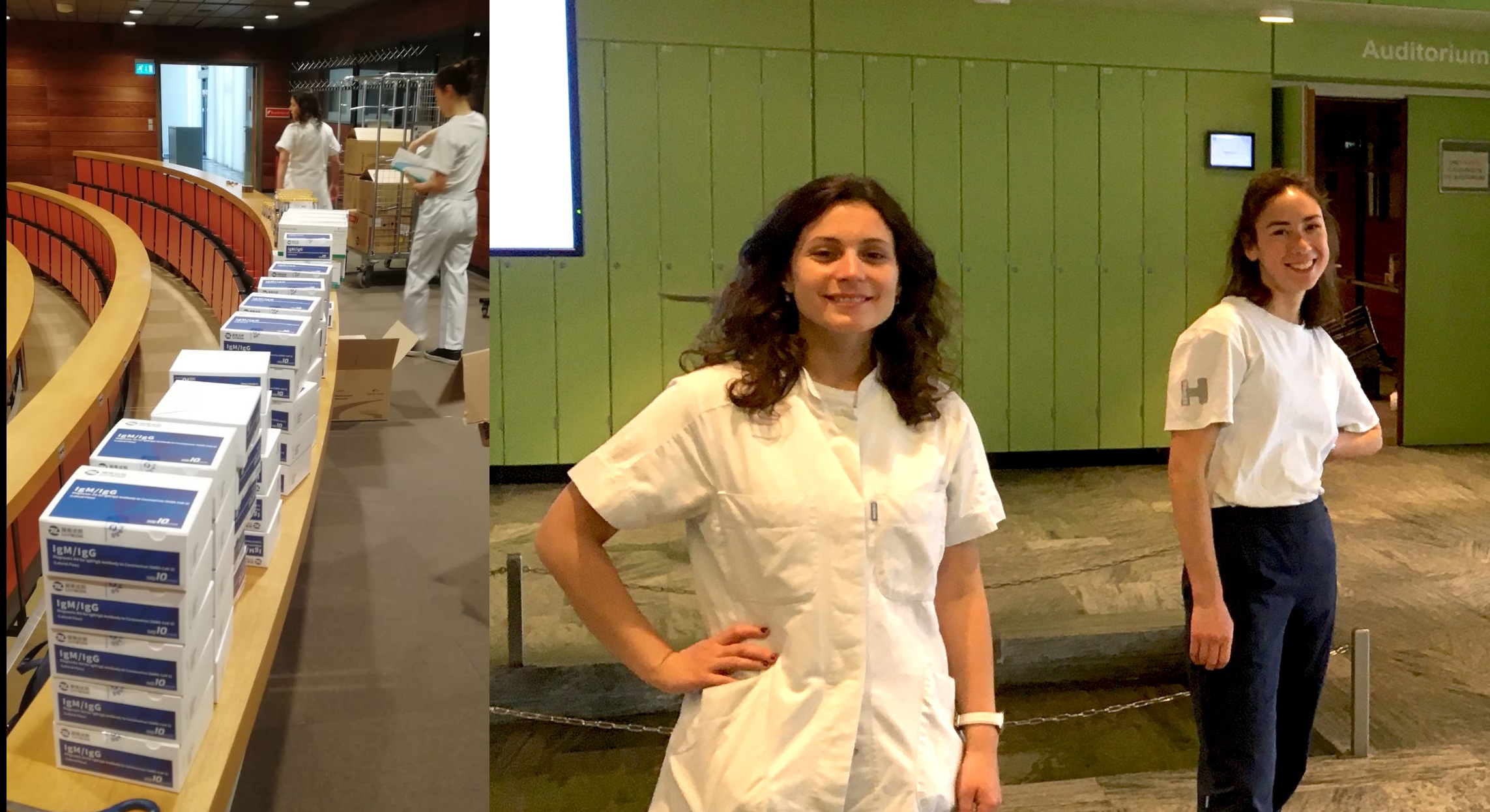COVID19: BRIC researchers helping out at hospital

In April, Rigshospitalet called upon staff, to help with the screening for antibodies against COVID-19. The goal was to test 8000 health care employees over 3 days, 15-17th April 2020, and several people from BRIC answered the call.
Voluntary helpers from BRIC include:
Grønbæk group: Amalie Bach Nielsen (PhD), Astrid Østergaard Mortensen (Nurse), Eileen Donohue Wedge (Academic assistant), Helle Egeberg Hother (Project coordinator), Katja Kaastrup (Academic assistant), Samuele Narcisi (Master student) and Sofia Bentivegna (PhD).
Jensen group: Isidora Banjac (Research assistant).
Khodosevich group: Laura Wolbeck (PhD).
Porse group: Julia Cathryn Hlavka-Zhang (PhD).
We have asked a few of the voluntary workers from BRIC, what motivated them to help, and how they experienced the situation.
How did you end up helping at the hospital and for how long did you do this?
Sofia Bentivegna (iMED PhD fellow in Grønbæk group): I heard about the volunteer work at the hospital because Kirsten Grønbæk (who is my PhD supervisor) was involved in the project and sent an invitation to our group and also to all BRIC staff
Julia Cathryn Hlavka-Zhang (iMED PhD fellow in Porse Group): I followed up on an email that Kirsten Grønbæk sent around about this opportunity to help with Rigshospitalet staff screening for SARS-CoV-2 antibodies. We helped over the 4 days that this screening was taking place.
Isidora Banjac (Research assistant in Jensen group): I received an email asking for medical students who would help with COVID-19 serology screening so I contacted them and let them know I can help. I was helping on the second day of screening.
In which ways were you able to help?
Sofia Bentivegna (iMED PhD fellow in Grønbæk group): During the 4 days of volunteering, I had different tasks. The first day we (with others volunteers also from BRIC) helped to prepare the supplies for the different departments of Rigshospitalet. Each department should have enough blood kits, bands and tubes for all its staff when the screening started. From Wednesday to Friday, I had other tasks, like checking if the different test stations where working with enough supplies, carrying the tubes from the different test stations to the blood bank, and even print documents.
Julia Cathryn Hlavka-Zhang (iMED PhD fellow in Porse Group): The start involved putting together the ‘testing packages’ for the different hospital departments to pick up, keeping an inventory of kits, and relaying information to the staff on the testing procedures. For the next three days, I was a ‘picoline’ for the blood samples, so picking them up from testing spots around the hospital and delivering them to the pathology facility.
Isidora Banjac (Research assistant in Jensen group): I was sitting at the front desk of the POP-up clinic, where people would come to get their PTBs printed or ask if they have some questions about the screening.
What motivated you to volunteer as helper?
Sofia Bentivegna (iMED PhD fellow in Grønbæk group): I think it was an opportunity to contribute to the enormous work that doctors and nurses are doing to deal with this covid situation, who are the people who are really facing the problem. Also, as I am a foreigner who recently arrived to Denmark, I think it is a good idea to volunteer in different activities as a way to integrate myself into the society and to generate human bonds.
Julia Cathryn Hlavka-Zhang (iMED PhD fellow in Porse Group): Until then, I had only heard about Corona studies going on but not sure how to get involved; so when this opportunity came along I wanted to contribute whatever skills and time I had. Also, just being a young healthy person who could help in a hospital, seemed like a reason.
Isidora Banjac (Research assistant in Jensen group): I am an MD doing a PhD here at BRIC, so it made sense to me to help out in the screening of hospital staff. I think the information we will get from that screening will help in better organization of the health care in the future months and also setting the pace of gradual reopenning of the society.
What did the experience give you personally?
Sofia Bentivegna (iMED PhD fellow in Grønbæk group): It was nice to work a few days in a different place and to learn at least a little of how is the daily work at a very different job environment as it is the hospital. It was satisfying to be able to help and to be useful in the screening even though am I not a doctor and even though my tasks were “minor” compared to what other people do. I think that the volunteer work is a clear example of how small actions carried out by many people can help in a greater cause.
Julia Cathryn Hlavka-Zhang (iMED PhD fellow in Porse Group): It was a strong reminder of how valuable it is to show support. Our roles were only a tiny aspect of this huge project, however, what seemed most appreciated was our sheer presence and willingness to help to the end. Also, the language barrier was possibly the most challenging aspect. Given the circumstance, it was a bit stressful at the start, but over the days we found our ways to work around this. By the end, we walked out feeling like we learnt a lot more about this new country we moved to 2.5 months ago.
Isidora Banjac (Research assistant in Jensen group): I guess it felt nice to be a part of the screening and playing a small role in the fight against COVID-19.
